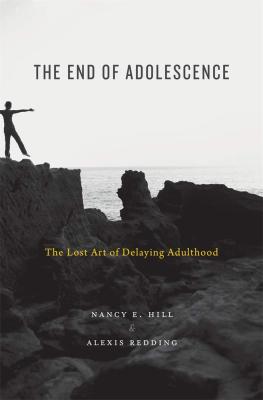SRCD Members in the News: SRCD’s President-Elect Dr. Nancy Hill
Is Gen Z resistant to growing up? SRCD’s President-Elect, Dr. Nancy Hill with Professor Alexis Redding, co-authored The End of Adolescence: The Lost Art of Delaying Adulthood to debunk this stereotype and explain how we can better support young adults.

About President-Elect Nancy Hill’s forthcoming book (March 23, 2021), The End of Adolescence: The Lost Art of Delaying Adulthood:
Experts and the public are convinced that young people today are trapped in an extended adolescence―coddled, unaccountable, and more reluctant to take on adult responsibilities than previous generations. Dr. Hill and Professor Redding argue that what is perceived as stalled development is in fact typical. Those reprimanding today’s youth have forgotten that they once balked at the transition to adulthood themselves.
From an abandoned archive of recordings of college students from half a century ago, Hill and Redding discovered that there is nothing new about feeling insecure, questioning identities, and struggling to find purpose. Like many of today’s young adults, those of two generations ago also felt isolated and anxious that the path to success felt fearfully narrow. This earlier cohort, too, worried about whether they could make it on their own.
Hill and Redding offer an alternative view of delaying adulthood and identify the benefits of taking additional time to construct a meaningful future. When adults set aside judgment, there is a lot they can do to ensure that young adults get the same developmental chances they had.
Several SRCD members offer their endorsements of the book:
Professors Hill and Redding convincingly dismiss the widely held view that contemporary young people are fundamentally different from their counterparts who came of age a half-century ago. The End of Adolescence reminds us that the essential psychological challenges inherent in becoming an adult in today’s society—and the supports that adolescents need to make this transition successfully—are not all that dissimilar from what they were in past generations. Scholars and students of adolescence should read this thoughtful book.
The End of Adolescence fills a void in research on adolescence and young adulthood development, as Hill and Redding address an age-old question: ‘Are kids these days different than those in the past?’ Hill and Redding’s innovative research reveals that what has changed is not today’s youth, but rather the historical context in which they have developed. This timely book should be required reading for anyone interested in a deeper understanding of adolescence and young adult development.
This book will be available for purchase by Harvard University Press and Amazon.com on March 23, 2021.